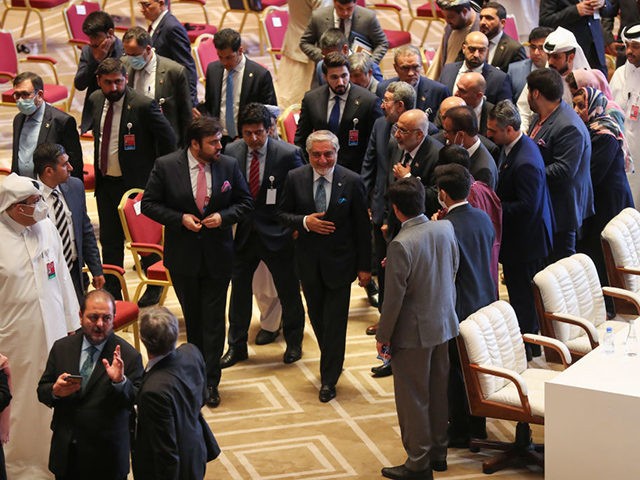Government officials in Afghanistan confirmed over 50 casualties in several attacks by the Taliban jihadist organization on Thursday, strikes that occurred as the Taliban attempts to broker a peace deal with both Kabul and the U.S. government.
Taliban representatives attended the beginning of what have been billed as historic talks to end the nearly two-decade-old Afghan war this weekend — a milestone for U.S. negotiations in getting the Taliban to sit at the table with the legitimate government of the country at all. The Taliban considers itself the only legal government of the “Islamic Emirate of Afghanistan” and deems the true government of Afghanistan a foreign-imposed aberration.
Taliban representatives at the talks in Doha, Qatar — where the Taliban maintains its official headquarters — told various reporters in interviews that they hope the talks will result in the liberation of thousands of jihadis currently imprisoned in Afghanistan and the imposition of a strict sharia regime in the country.
Afghanistan’s Tolo News network reported on Thursday that multiple attacks resulted in the deaths of at least 32 Afghan security force troops and 25 injuries, totaling over 50 casualties. The attack reportedly occurred Wednesday night. Tolo documented attacks in four of the nation’s provinces overnight.
The largest, in Nangarhar province, resulted in 20 dead Afghan troops and 29 Taliban jihadis killed, according to a spokesman for the governor of Nangarhar. Smaller bombings and raids occurred in Herat, Badghis, and Uruzgan provinces.
Tolo noted that the Taliban had not issued any officials statements regarding the attacks. A spokesman for the terrorist organization, Mohammad Naeem, did speak to both Tolo News and Afghanistan’s Khaama Press on Wednesday, signaling pause in a resolution of the dispute between the group and Kabul.
“It does not make sense to end 20 years of war in one hour. In our perspective, it will be logical to discuss the main aspects of the problems and the war and then finalize a ceasefire so that the problem is resolved permanently,” Naeem told Tolo News, emphasizing that the group would not agree to a ceasefire without extensive dialogue to avoid having to break the ceasefire shortly after brokering it.
“Suppose, if we announce a ceasefire today, but then we fail to reach an agreement at the negotiating table tomorrow, do we go toward the war again? What does this mean?” he asked.
“We have entered the peace process with a strong will and determination, we want this problem finally to be resolved. The process is complicated and it has its own complexities, but we are hopeful that the problems come to an end,” Naeem told Tolo.
The spokesman added that the two main demands of the Taliban are “to end the invasion of Afghanistan” by American and NATO forces and to establish “a true Islamic system” in the country.
Afghanistan is currently an Islamic republic in which the law punishes many violations of sharia, the Islamic law, including blasphemy against Islam and apostasy, or leaving the faith.
Taliban representatives at the event in Doha this weekend also emphasized the importance to them of imposing sharia on the country to a more severe degree than the current government.
“(We want) a government in which the Holy Quran is ruling, the hadith of the messenger (Muhammad) is ruling, the Hanafi school is there, and the occupation is over,” Mawlawi Abdul Kabir, a member of the Taliban negotiating team, told Tolo.
Abdullah Abdullah, the head of the Afghan government’s negotiating team, appeared sensitive to this demand in his statements addressing the group this weekend.
“Ladies and gentlemen, on the guidance of our sacred religion Islam and on the basis of our free will and the right demands of our noble nation, we have come to this country to achieve a dignified and lasting peace,” Abdullah said.
Secretary of State Mike Pompeo, present for the opening of talks in Qatar, described them as necessary to complete the removal of U.S. troops from the country within the next year.
“President Trump laid out two objectives: One, reduce the American footprint there and get our soldiers, sailors, airmen, and Marines — get everybody home,” Pompeo told Breitbart News. “Stop getting people killed there. Get the maximum extent feasible. Second, we’re going to have to make sure we protect the homeland.”
The primary negotiating point on the part of the American government is convincing the Taliban to no longer harbor jihadist organizations in the region, primarily al-Qaeda, the group responsible for the September 11, 2001, terrorist attacks that prompted the U.S. invasion of Afghanistan. State Department spokeswoman Morgan Ortagus, in an interview last week, stated that Washington does not see the Afghanistan war as winnable after 19 years of fighting.
“We know that there is no military end to the — there is no military solution to the end of the war in Afghanistan. So, we are going to try our best to bring all sides to the table, women, civil society, the government of Afghanistan, and the Taliban to end America’s longest war,” Ortagus told Fox News.

COMMENTS
Please let us know if you're having issues with commenting.